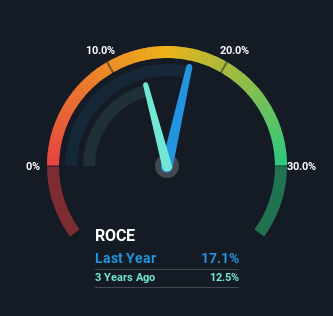- South Korea
- /
- Software
- /
- KOSDAQ:A045340
Returns On Capital At Total Soft Bank (KOSDAQ:045340) Have Stalled
If we want to find a potential multi-bagger, often there are underlying trends that can provide clues. Amongst other things, we'll want to see two things; firstly, a growing return on capital employed (ROCE) and secondly, an expansion in the company's amount of capital employed. If you see this, it typically means it's a company with a great business model and plenty of profitable reinvestment opportunities. So, when we ran our eye over Total Soft Bank's (KOSDAQ:045340) trend of ROCE, we liked what we saw.
What Is Return On Capital Employed (ROCE)?
Just to clarify if you're unsure, ROCE is a metric for evaluating how much pre-tax income (in percentage terms) a company earns on the capital invested in its business. To calculate this metric for Total Soft Bank, this is the formula:
Return on Capital Employed = Earnings Before Interest and Tax (EBIT) ÷ (Total Assets - Current Liabilities)
0.17 = ₩5.5b ÷ (₩38b - ₩6.1b) (Based on the trailing twelve months to September 2024).
Thus, Total Soft Bank has an ROCE of 17%. In absolute terms, that's a satisfactory return, but compared to the Software industry average of 5.5% it's much better.
View our latest analysis for Total Soft Bank

Historical performance is a great place to start when researching a stock so above you can see the gauge for Total Soft Bank's ROCE against it's prior returns. If you'd like to look at how Total Soft Bank has performed in the past in other metrics, you can view this free graph of Total Soft Bank's past earnings, revenue and cash flow.
What Does the ROCE Trend For Total Soft Bank Tell Us?
While the returns on capital are good, they haven't moved much. Over the past five years, ROCE has remained relatively flat at around 17% and the business has deployed 81% more capital into its operations. 17% is a pretty standard return, and it provides some comfort knowing that Total Soft Bank has consistently earned this amount. Over long periods of time, returns like these might not be too exciting, but with consistency they can pay off in terms of share price returns.
Our Take On Total Soft Bank's ROCE
The main thing to remember is that Total Soft Bank has proven its ability to continually reinvest at respectable rates of return. On top of that, the stock has rewarded shareholders with a remarkable 165% return to those who've held over the last five years. So while the positive underlying trends may be accounted for by investors, we still think this stock is worth looking into further.
Since virtually every company faces some risks, it's worth knowing what they are, and we've spotted 2 warning signs for Total Soft Bank (of which 1 can't be ignored!) that you should know about.
While Total Soft Bank may not currently earn the highest returns, we've compiled a list of companies that currently earn more than 25% return on equity. Check out this free list here.
Valuation is complex, but we're here to simplify it.
Discover if Total Soft Bank might be undervalued or overvalued with our detailed analysis, featuring fair value estimates, potential risks, dividends, insider trades, and its financial condition.
Access Free AnalysisHave feedback on this article? Concerned about the content? Get in touch with us directly. Alternatively, email editorial-team (at) simplywallst.com.
This article by Simply Wall St is general in nature. We provide commentary based on historical data and analyst forecasts only using an unbiased methodology and our articles are not intended to be financial advice. It does not constitute a recommendation to buy or sell any stock, and does not take account of your objectives, or your financial situation. We aim to bring you long-term focused analysis driven by fundamental data. Note that our analysis may not factor in the latest price-sensitive company announcements or qualitative material. Simply Wall St has no position in any stocks mentioned.
About KOSDAQ:A045340
Total Soft Bank
Operates as maritime logistics solutions company in South Korea.
Outstanding track record with flawless balance sheet.
Market Insights
Community Narratives


Recently Updated Narratives


MINISO's fair value is projected at 26.69 with an anticipated PE ratio shift of 20x


The Quiet Giant That Became AI’s Power Grid


Nova Ljubljanska Banka d.d will expect a 11.2% revenue boost driving future growth
Popular Narratives


The company that turned a verb into a global necessity and basically runs the modern internet, digital ads, smartphones, maps, and AI.


MicroVision will explode future revenue by 380.37% with a vision towards success



